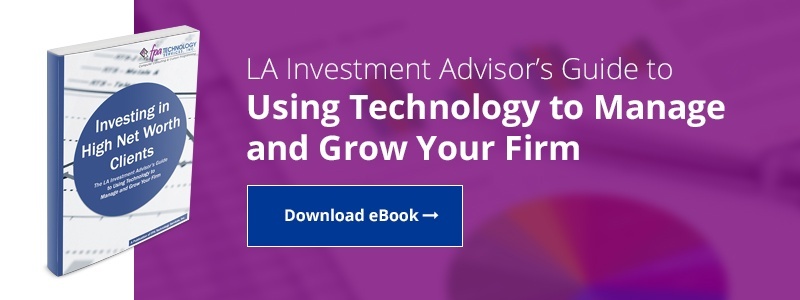 LA investment advisors rely on smartphones, tablets, and laptops because they enable busy financial professionals to conduct business from anywhere and at any time.
LA investment advisors rely on smartphones, tablets, and laptops because they enable busy financial professionals to conduct business from anywhere and at any time.
But this valuable portability also makes these devices easier to lose or steal, which is a serious concern when they store such sensitive and confidential information. At the same time, their “always on” Internet connections also make them vulnerable to hacker activity.
This article presents three mobile security best practices that will reduce the likelihood of a portable device being compromised, allowing investment advisors to assist clients remotely while still allowing your Chief Compliance Officer to sleep at night.
Enable Remote Wipe
Remote wipe is a powerful security feature that enables a device owner or network administrator to send a command that will delete stored data.
The nature and extent of the deletions will depend on the device type, what operating system (OS) it is running, and the presence of any third-party mobile device management software. Some programs will only remove data in certain folders, while others will return the device to factory settings or even remove all programs entirely, making the phone or tablet useless to anyone.
Devices that have been rooted, jailbroken, or have a non-manufacturer ROM-base may not respond to wipe commands, so advisors using their own phones should verify that nothing has been altered contrary to manufacturer guidelines.
Only Install Apps from Approved / Trusted Sources
This one is especially important if a financial advisory firm has a BYOD policy. Employees should only shop for apps at reputable online stores, and avoid anything from unknown sources. Even when the app has acceptable origins, read its privacy policy thoroughly before installing.
Personal data is in hot demand, and even seemingly harmless games can seek full access to address books and call logs. Some of the more mature IT shops have (cutting edge) tools to manage passwords and apps so that devices can be managed and controlled whether they’re owned by the firm or the staff and still maintain the needed level of security and compliance.
These are the sorts of IT service providers with whom a firm should be aligned.
Turn Off Wi-Fi and Bluetooth When Not In Use
Hackers constantly look for unsecured devices by using Wi-Fi and Bluetooth signals. To prevent intrusions of this nature, advisors should turn off their transmitter for both signals. If they are traveling and do not need a data-heavy connection for streaming video and program downloads, they should rely on their phone or tablet’s data plan connection for casual surfing.
This is a notorious hole that hackers love to exploit at airports, Starbucks, libraries, or any other common open Wi-Fi hot spot.
Bottom Line
Strong security measures, such as data encryption, prudent downloading practices, and the ability to control access rights to a company network are all critical for effective mobile device management.
Developing a set of mobile security best practices will also ensure that information stored on company- or employee-owned devices is kept safe from prying eyes.
What mobile security best practices has your firm adopted? Have they been successful so far? Let us know your thoughts in the Comments box below.
And to follow-through on the tips introduced in this short article, be sure to download your free guide, Investing in High Net Worth Clients: The LA Investment Advisor's Guide to Using Technology to Manage and Grow Your Firm.
/fpa-logo-tagline.gif)






